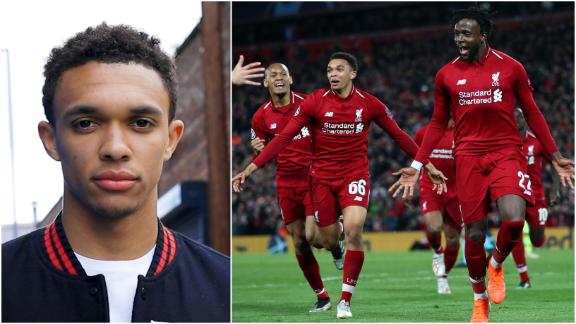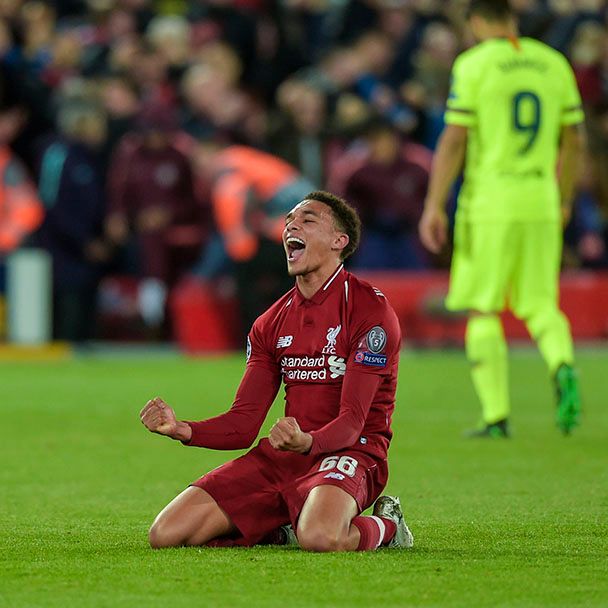Marcus Rashford. Wilfried Zaha. Sane.
Trent is rattling off opponents that have been the most menacing before he zeros in on the tormentor-in-chief. “I played away against Eden Hazard this season for the first time directly and that was incredibly difficult,” he says. “I thought he was the most talented winger I’ve come up against — special, unbelievable strength and acceleration. He is very hard to keep quiet.
“In the Premier League, most of the time when you’re lining up, the opposition’s best players are their wingers with a few exceptions. They’re the fastest, the most dangerous. Robbo [Andy Robertson] and I always joke that we’re fortunate to have Mo [Salah] and Sadio [Mane] on the same team as us, because they can keep full-backs up at night.
“Jordi Alba was really hard to defend against too. In the first half, he just wouldn’t stop going, his running was relentless. I’ve never played against a full-back like that before — he just kept wanting to go past me and was getting back. It’s good to know what makes me feel uncomfortable, so I can use it against other full-backs.”
Extended time in Alexander-Arnold’s company reinforces Klopp’s assertion that he encapsulates the “we’re never gonna stop” line in Liverpool’s Allez, Allez, Allez Champions League anthem. While his dimpled, soft face still shows the boy, his mindset speaks to his maturity. Trent is engaged, thoughtfully mapping his answers and there is already an intensity about him that could be felt in similar settings with Steven Gerrard. He is serious with a steely determination that drips through every facet of his life.
He doesn’t dwell on high points, instead digging through the kind of contests most would want to permanently delete in order to extract lessons from them.
“It’s important to realise what you’ve done well in your good games and hold onto that, but what really shapes you as a player is what you take away from the nightmare matches,” he says. “[Academy director] Alex Inglethorpe told me once that the real mistake is not learning from your mistake. If you understand your error and work on it, you gain a strength.
“When I have a bad game, I dissect it in every detail. What did I do during the preparation? What was my mindset going into it?
“It’s important for me to understand what works well in terms of routines and how I condition my mind. I’m learning to personalise and perfect my preparation.”
Alexander-Arnold’s function as a right-back has often been discussed by fans and former players as a short-term solution before he reverts to the centre of the pitch.
But given his excellence on the defensive flank, would he want to remain there and try to become the world’s undisputed best in the position?
“I just want to win trophies more than anything and it doesn’t matter where I am on the pitch,” he says. “Playing for the club I love is more important than any position. I’m a right-back now and I want to be the best at it.
“Just as Ashley Cole did when I was growing up, I want to change the way full-backs are thought of along with Robbo. We want to show that full-backs often influence a game a lot more than positions that are traditionally thought of as the most prestigious. It’s a valuable role as Klopp and Guardiola have both said and it’s certainly one of the most demanding. We are measured equally by how we attack and how we defend more than any other position. You’ve got to get assists, you’ve got to keep clean sheets.
“We have the obligation to get forward and it’s non-negotiable to get back — you have to do both equally well. I hope we can help change the idea that no kids want to grow up and be a fullback.”

Trent Alexander-Arnold is only 20 but has become a fixture in the Liverpool first team, even setting a new record for Premier League assists by a defender. Matt Gordon
While the rain stubbornly bucketed down in Kowloon during the preseason tour of Hong Kong in 2017, Klopp issued a challenge to Alexander-Arnold that he privately acknowledged the youngster would weather.
“Trent, what potential!,” the 51-year-old said. “He has to improve on his defending now though, that is the aim. Yes, he is a kid, but the moment he can defend like a man, he can play regularly in the Premier League. As long as he defends like a kid and attacks like a man, then you have only half of this amazing talent.
“I cannot change this — only he can. He knows and is excited about the improvement he can make.” Fast forward to 2019 and Alexander-Arnold, who now holds the Premier League assist record for a defender with 12 this season, was part of the meanest rearguard in England’s top flight.
“The manager has got so much out of me,” he says. “He is demanding and never allows you to get comfortable. He expects to consistently see more from his players, which suits me because I want to go beyond my limits.”
Liverpool’s backroom team enthuse about Alexander-Arnold’s knowledge of when and how to defend on the front foot in midfield areas, jumping tight with a wide man or full-back and protecting the half space — the areas on the pitch between the wide and central zones that teams in possession look to exploit. They’ve observed a continual upward trend in how he defends against the ball and closes the last line.
His offensive might is crucial weaponry in Klopp’s aggressive blueprint, as is his ability to operate with direction and take responsibility on the pitch.

Liverpool starlet Trent Alexander-Arnold relives the bold assist against Barcelona that helped the Reds reach the Champions League Final.
“I’ve definitely progressed defensively and I’ve spent a lot of time working through all the situations I know I can get better in,” Alexander-Arnold says. “Playing against some of the best players in the world on a daily basis in training is massive for me, because I’m pushing myself to the maximum in every session. We’ve got a group that are constantly searching for improvement so I go into training knowing it’s an opportunity to get better. I tell myself ‘don’t waste a day.’
“The senior players have given me the same message — Milly [James Milner] especially. He always says I should make the most of my talent and get everything out of the game that I can because it all goes so quickly.
“I don’t want to look back with regrets. I don’t want to think I could have been a better player, that I could’ve put in more effort.”
The Scouser, who finally has a fan chant that references his local heritage, speaks with such authority on the responsibility he feels to win. Having repeatedly declared his ambition to captain his boyhood club in the future, such comments offer a snapshot of someone who is capable, too. “We’re at a place where we demand silverware from ourselves,” he says. “It’s not something we shy away from or are scared of: we’re one of the best sides in the world. We can’t put too much pressure on our first major season of competing on two big fronts, but ultimately, it’s the objective we’re striving towards.
“If we don’t win a lot of silverware over the next few years then something has gone massively wrong, because with this manager, with the way the team is looking, with the way that we’ve been playing — it’s just incredible and we will keep going and going and going. That will be rewarded.”

Trent Alexander-Arnold helped seal Liverpool’s magical comeback vs. Barcelona but didn’t dwell on it: “For us, it’s just another good performance, a good game — nothing more, nothing less. We need to focus on the next challenge.” TF-Images/Getty Images
As a 6-year-old then already tied to Liverpool’s Academy, Alexander-Arnold watched the magic of Istanbul — “a night no one will forget and that showed the character of Liverpool, the team and the city” — unfold in the family home, two minutes from Melwood. He remembers the intoxication of the victory parade, after Liverpool’s comeback from 3-0 down against Milan, with the Reds winning on penalties, snaking past his three-bedroom duplex and for the first time in this interview, the “An Hour for Others” ambassador allows himself to drink in just how far he has come and how rapidly that has happened.
It is clear that he is not glowing on an individual level, but for the people he gets to share these experiences with. His mother, Diane, has been an “extension of Liverpool’s coaching staff,” while his father, Michael, has preached education, preparation and strategy. Older brother Tyler, four years his senior, is Alexander-Arnold’s “deep-thinking, intelligent” manager. Marcell, three years his junior, was his roommate at the West Derby house, which they only moved out of when he was 17.
“I wouldn’t be the person and player I am today without them,” Alexander-Arnold says. “I’d be a million miles away from it. They’ve been so supportive and influential — and this is no exaggeration — they have sacrificed everything for me. They have sacrificed themselves: their dreams and their hopes so they could make mine a reality. They’ve been there for me when times have been hard, when I’ve been down. And they’ve celebrated the happiest moments with me as well.
“I never want that to change. I absolutely love going home to them and just being Trent.”
Alexander-Arnold thinks about “his people” too. The ones who, like him, devote themselves to Liverpool — albeit on the terraces. He is fiercely proud of being Scouse and relishes representing his city on a worldwide stage. “There’s a difference to this place,” he says. “People who aren’t from Liverpool probably think we’re over the top, but that’s because we’re really passionate about the things we love. We stand united on important issues and we fight for what we believe in with everything we’ve got.”
He has a tight bond with those who flock to Anfield, realising they possess the power to lift Liverpool and act as kryptonite even to the game’s greatest teams and players.
“Without the fans, what we did against Barcelona would have been an impossible task to pull off,” Alexander-Arnold says. “The performance was a thank you to them, to show them they are special, that they do make a difference. It was appreciation for every single individual that comes to watch us, that gives up their time and their money to support us around the country and the continent, that love this club and believe in it even during tough times. And for the supporters who can’t get to the matches, but wake up at strange times and go out of their way to follow us throughout a season.”
The biggest show of gratitude would be Liverpool turning almost into an absolute in Madrid, soaked in champagne and confetti as they pass around the European Cup.
“This time we know what it’s all about, we understand everything around the game so we’ll be more prepared in that respect,” Alexander-Arnold says.
“We’re a more complete team. During the course of this season, we’ve shown a variety of ways to win and to conduct ourselves. When we score first, we’re very hard to break down. If we need a late goal, we can produce it. If we need to manage a period of a game and take the sting out of it, we know what to do.
“If we’re not at 100 percent, Spurs can hurt us. But we will be leaving everything we’ve got on that pitch.”
Melissa Reddy is a correspondent for ESPN FC.
